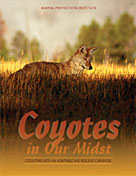Targeting Trapping & Hunting
Through the Administrative Rulemaking Process
Historically, wildlife management has been dominated by consumptive wildlife users (hunters, trappers, and anglers), especially at the state level. Most state wildlife agencies depend heavily on revenues from hunting, trapping, and fishing license sales, and excise taxes levied on hunting and fishing gear. Since these agencies receive little funding from the general public, they have effectively chosen to ignore the opinions of the vast majority of their constituents. The agencies' funds are also disproportionately spent on "game" species while "non-game" species receive little or no consideration. Funding for sensitive species is often so low that in many areas some threatened and endangered species lack recovery plans.
However, the tide is beginning to turn. Non-consumptive wildlife users are making their voices heard and influencing state wildlife management policies through the administrative rulemaking process.
State Wildlife Commissions
Every state has a commission, council or board to monitor and oversee the state wildlife agency's activities, the expenditure of funds, and the establishment of wildlife management policies and regulations. These commissions generally consist of 4 to 11 members appointed by the governor. Unfortunately, the overwhelming majority of commissioners represent the views of hunters, trappers, and other consumptive wildlife users; very few have a background in wildlife biology or ecosystem management.
Getting Your Voice Heard
States review their hunting, trapping, and fishing regulations every one to three years. Generally, the wildlife agency proposes changes to the oversight commission for approval. During this process, most states publish proposed regulation changes and hold public hearings where any citizen can testify about particular proposals and/or submit written comments. Generally, the oversight commissions "rubber stamp" agency proposals but give little consideration to citizens who might prefer that wildlife be managed less intrusively.
Hunter/trapper interest groups have dominated this process for far too long. Here's how you can help.
1. Contact your state wildlife agency and ask:
- To be placed on the agency's mailing list. If your agency does not maintain an e-mail or mailing list ask it to start one. You can also monitor your agency's website for announcements.
- For a schedule of its annual hearings on state hunting and trapping regulations and proposed changes. State wildlife commissions usually hold at least three public meetings each year. Most commissions include agenda items with the public hearing notices.
- For a copy of the state hunting and trapping guide that should include regulations, bag limits, and species-specific hunt/trap seasons.
2. Review agency newsletters & public notices for:
- Proposed Regulation Changes: What changes are being proposed for the hunting and trapping regulations in your state? State wildlife agencies frequently amend regulations, lengthen trapping and hunting seasons and "bag limits," and relax restrictions on the types of trapping/hunting equipment/methods that are allowed.
- Proposed Expenditures or New Programs: State wildlife agencies continually make proposals to increase spending for consumptive uses or new programs such as "youth hunt days," or "becoming an outdoors woman," aimed at recruiting new consumptive users. Given that, in most states, the majority of residents and visitors do not hunt or trap, the time, money, and energy required to promote consumptive wildlife uses would be better spent educating the public about non-hunting activities, such as hiking, wildlife observation, photography, camping, etc.
3. Make Proposals & Get Your Issue(s) on The Agenda
- Contact your state wildlife commission and ask for its guidelines regarding the administrative rulemaking process to amend trapping/hunting regulations.
- Many states require that any proposed changes to the trapping/hunting regulations first be placed on the agenda if they are to be considered by the state wildlife commission. Therefore, it is very important to get your proposal/agenda item on the official agenda as soon as you are prepared. Other states do not require this; you may bring up a new issue at the meeting itself during the open public comment period. Ask your agency which process it follows.
4. Contact Us
We can assist you in obtaining information, choosing a target, drafting your comments and/or testimony, and gathering the support of other animal advocates in your state. Visit our contact page and get started.


